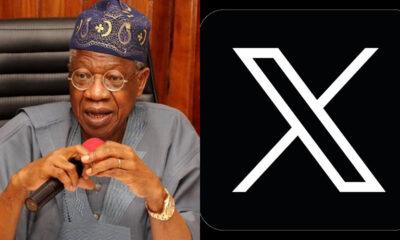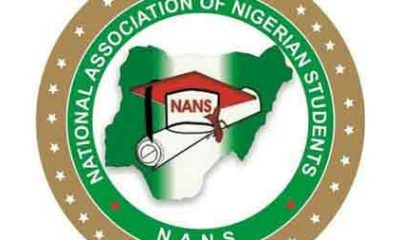Business
FG bows to pressure, postpones fuel subsidy removal

FG bows to pressure, postpones fuel subsidy removal
The Federal Government on Thursday said it would no longer be visible to start fuel subsidy removal implementation by June this year as earlier announced.
This came through the National Economic Council (NEC) presided over by Vice-President Yemi Osinbajo.
It agreed that the timing for the removal of petrol subsidy should not be now but that all of the preparatory works should continue in consultation with the states and other key stakeholders, including representatives of the incoming administration.
Minister of Finance, Budget and National Planning, Zainab Ahmed, said the “council agreed that the fuel subsidy must be removed earlier rather than later because it is not sustainable”.
She said the subsidy removal had to be done in such a way that the impact, as much as possible, “is mitigated on the lives of ordinary Nigerians”.
The organised labour has kicked the subsidy removal and vowed to frustrate the plan.
The workers unions have stuck to their position despite the recent $800 million grant from the World Bank as part of the subsidy palliatives measures.
FG bows to pressure, postpones fuel subsidy removal
Business
Meta cracks down on ‘Yahoo Boys’, deletes 63,000 accounts

Meta cracks down on ‘Yahoo Boys’, deletes 63,000 accounts
Meta Platforms Inc., the parent company of Facebook, Instagram, and WhatsApp, has removed 63,000 accounts associated with the notorious “Yahoo Boys” scam group, the company announced in its Q1 2024 Adversarial Threat Report on Wednesday.
The accounts, deleted over the past few weeks, were used for financial sextortion scams and distributing blackmail scripts. Meta reported that a smaller network of 2,500 accounts, linked to around 20 individuals, primarily targeted adult men in the United States using fake identities.
Meta said it identified and disabled these accounts through a combination of advanced technical signals and comprehensive investigations, enhancing its automated detection systems.
“Financial sextortion is a borderless crime, fueled in recent years by the increased activity of Yahoo Boys, loosely organised cybercriminals operating largely out of Nigeria that specialize in different types of scams,” the social media giant stated.
It added, “We’ve removed around 63,000 accounts in Nigeria attempting to target people with financial sextortion scams, including a coordinated network of around 2,500 accounts.”
“We’ve also removed a set of Facebook accounts, Pages, and groups run by Yahoo Boys—banned under our Dangerous Organizations and Individuals policy—that were attempting to organize, recruit and train new scammers,” the company explained.
READ ALSO:
- Tinubu welcomes ex-Senate President Anyim into APC
- Customs seize vehicles illegally taking large amount of fuel to Cameroon
- Illegal petroleum storage facility discovered in Lagos
During the investigation, Meta said it found that most scammers’ attempts were unsuccessful, though some had targeted minors. These cases were reported to the National Center for Missing and Exploited Children.
Meta revealed that it also shared information with other tech companies via the Tech Coalition’s Lantern program to help curb these scams across platforms.
Further, the parent company of Facebook said it removed around 7,200 assets in Nigeria, including 1,300 Facebook accounts, 200 pages, and 5,700 groups that were providing scam-related resources.
These assets were found offering scripts and guides for scams and sharing links to collections of photos for creating fake accounts, it expounded.
Since this disruption, Meta’s systems have been actively blocking attempts from these groups to return, continually improving their detection capabilities.
The company noted that it has also been working closely with law enforcement, supporting investigations and prosecutions by responding to legal requests and alerting authorities to imminent threats.
The social media giant stated that its efforts extend beyond account removal.
“We also fund and support NCMEC and the International Justice Mission to run Project Boost, a program that trains law enforcement agencies around the world in processing and acting on NCMEC reports.
Meta cracks down on ‘Yahoo Boys’, deletes 63,000 accounts
Business
We increased interest rates 26.75% to stem inflation – Cardoso

We increased interest rates 26.75% to stem inflation – Cardoso
In response to mounting public frustration over Nigeria’s economic challenges the Central Bank of Nigeria’s (CBN) Governor, Yemi Cardoso, to insufficient diversification, has attributed the horror to insufficient diversification efforts, excess liquidity, and global economic pressure.
He stated this yesterday at a media briefing to mark the conclusion of the Monetary Policy Committee (MPC)’s 296th meeting in Abuja.
According to him, the MPC increased interest rates by 50 basis points from 26.25 per cent to 26.75 per cent in an effort to manage inflation.
The apex bank adjusted the asymmetric corridor from +100/-300 to +500/-100 basis points, Cash Reserve Ratio (CRR) of deposit money banks at 45 per cent and merchant banks at 14 per cent while retaining Liquidity Ratio at 30 per cent.
Justifying the decisions, Cardoso explained that the MPC acknowledged the detrimental impact of rising prices on households and businesses across Nigeria and reiterated its commitment to maintaining price stability,
He expressed optimism that recent monetary policy measures, coupled with fiscal interventions aimed at addressing food inflation, would help stabilise prices in the near term.
Cardoso highlighted the persistent challenge of food inflation, which is worsened by insecurity in key agricultural areas and high transportation costs, and emphasised the urgent need to enhance food supply within Nigeria.
READ ALSO:
- Nigerians have right to protest, Amnesty International tells FG
- Police arrest fleeing killer of Brigadier General in Abuja, recover pistol
- Republican lawmaker hits Kamala Harris with articles of impeachment
He said: “It was observed that while monetary policy has been moderating aggregate demand, rising food and energy costs continue to exert upward pressure on price development. The prevailing insecurity in food producing areas and high cost of transportation of farm produce are also contributing to this trend. Members were therefore not oblivious to the urgent benefit of addressing these challenges as it will offer a sustainable solution to the persistent pressure on food prices.
“Also noted in its consideration is the increasing activities of middlemen who often finance smallholder farmers, aggregate, hoard and move farm produce across the border to neighboring countries. The committee suggested the need to put in check such activities in order to address the food supply deficit in the Nigerian market to moderate food prices.
The MPC therefore resolved to sustain collaboration with the fiscal authority to ensure that inflationary pressure is subdued.
Reacting, Nigeria’s first professor of the capital markets Prof Uche Uwaleke said: “Having done 750 basis points between February and May this year, I had predicted they would do a minimum of 50bps or a max of 100bps in July.
“I am glad to note that they chose the floor which is a sign that a complete halt is most likely in their next scheduled meeting in September.
But the adjustment to the asymmetric corridor around the MPR is a major source of concern for me.
“The MPC communique did not provide any explanation for increasing the SLR from +100 to +500 and the SDR from -300 to -100.
“By implication, with an MPR of 26.75 per cent, banks will now get loans from the CBN at 31.75 per cent while they will be remunerated for their excess deposits at 25.75 per cent. This will further squeeze liquidity from the banking system and jerk up cost of credit with adverse consequences on output and the equities market.
“The MPC communique should have made it clear why it was better to mask the tightening in the asymmetric corridor than reveal it in the MPR.
“May I observe that unlike previous MPC communiques, recent ones are silent regarding how the members voted. This information is useful at this stage even before their personal statements are published.
“I submit that as far as taming the current elevated inflation in Nigeria is concerned in view of its major non-monetary drivers, the fiscal side holds the ace”, he said.
We increased interest rates 26.75% to stem inflation – Cardoso
Business
Dangote refinery Vs NMDPRA: Petroleum Minister Lokpobiri intervenes, meets Aliko, Ahmed, NNPCL head
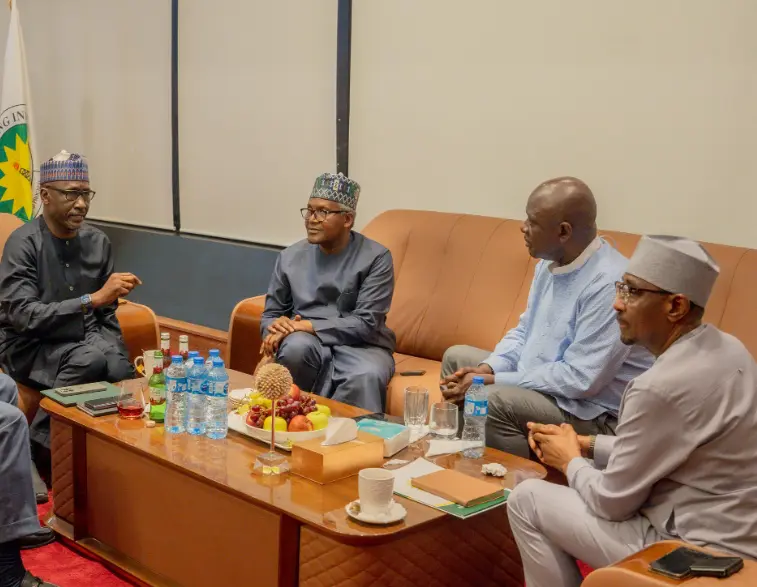
Dangote refinery Vs NMDPRA: Petroleum Minister Lokpobiri intervenes, meets Aliko, Ahmed, NNPCL head
Minister of State for Petroleum Resources (Oil), Heineken Lokpobiri, on Monday intervened in the open disagreement between the Dangote Refinery and the Nigerian Midstream and Downstream Petroleum Regulatory Authority (NMDPRA) over the state and quality of products from the new 650,000 barrel-per-day refinery.
in an apparent move to stop the altercations between the two parties, the minister on Monday met with Aliko Dangote (owner of Dangote refinery) and the Chief Executive of NMDPRA, Farouk Ahmed.
At the meeting also, according to a statement from the spokesperson for the minister, Amaka Okafor, were the heads of the Nigerian Upstream Petroleum Regulatory Commission (NUPRC) and that of the Nigerian National Petroleum Company Limited (NNPCL).
The disagreement between the NMDPRA head, Ahmed, and Africa’s richest man, Aliko Dangote, has dominated the public space.
Ahmed’s NMDPRA alleged that Dangote refinery was producing fuels with high sulphur content.
He said products from the facility, diesel and jet fuel, were of lower quality than the those imported by NNPCL.
Ahmed, who spoke in Port Harcourt, stated that Dangote refinery had not even been granted a full licence to operate, explaining that the facility cannot be solely relied upon to satisfy the fuel needs of the country.
The NMDPRA boss added that he had been under pressure by the Dangote refinery to stop all import of diesel and jet fuel, despite the fact that the imported fuels had lower sulphur content than the ones from Dangote refinery.
But conducting federal lawmakers round the facility in Lagos at the weekend, Dangote said contrary to the position of the head of the NMDPRA, his products were actually of far higher quality than imported fuels.
Dangote rejected the claims by the industry regulator that the products from his new refinery were substandard, expressing doubts over the quality of laboratories used in testing the standard of fuels in the country by NMDPRA.
The statement from the ministry said Lokpobiri convened the high-level meeting with key stakeholders to address and resolve the ongoing issues surrounding Dangote refinery.
Present at the meeting, apart from Dangote, the statement disclosed, were Ahmed, NUPRC’s Gbenga Komolafe, as well as NNPCL’s Mele Kyari.
The statement said, “The stakeholders expressed their gratitude to the minister for his exemplary leadership and timely intervention in facilitating the crucial dialogue. The meeting focused on finding a sustainable and lasting solution to the current impasse affecting the Dangote refinery, with all parties demonstrating a commitment to collaborative and proactive problem-solving.
“The minister emphasised the importance of cooperation and synergy among all stakeholders to ensure the success and optimal performance of the oil and gas sector, which is pivotal for Nigeria’s economic growth and energy security.
“This meeting marked a significant step towards resolving the challenges and underscored the minister’s dedication to fostering a conducive environment for Nigeria’s oil and gas sector.”
To convince his visitors that his position was factual, Dangote and his team tested samples of diesel bought from two separate filling stations and another one from his refinery in his laboratories.
He admitted that when the refinery started, it was turning out about 600ppm to 650ppm, which was still the best quality at the time.
He said the refinery now had less than 87ppm products and was set to hit 10ppm next month, compared to over 1,800ppm and over 2,600ppm, respectively, from the other tested samples.
-
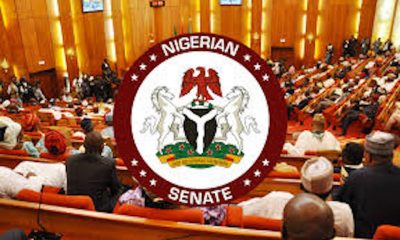
 News2 days ago
News2 days agoBREAKING: Senate passes minimum wage bill within an hour
-

 Business3 days ago
Business3 days agoDangote refinery Vs NMDPRA: Petroleum Minister Lokpobiri intervenes, meets Aliko, Ahmed, NNPCL head
-
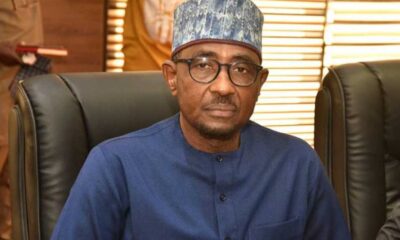
 News2 days ago
News2 days agoJUST IN: Reps call for suspension of NMDPRA CEO pending investigation
-

 News2 days ago
News2 days agoNLC can’t withdraw from protest it didn’t organise – Ajaero
-

 News2 days ago
News2 days agoNorthern group attacks Reps Minority Caucus for demanding Nnamdi Kanu release
-

 News3 days ago
News3 days agoWhy some people in NNPC are sabotaging Dangote refinery – Emir Sanusi
-

 International3 days ago
International3 days agoDozens killed as Palestinians flee Israel’s new offensive on Khan Younis
-

 Business3 days ago
Business3 days agoNaira drops to N1,585/$ on parallel market







